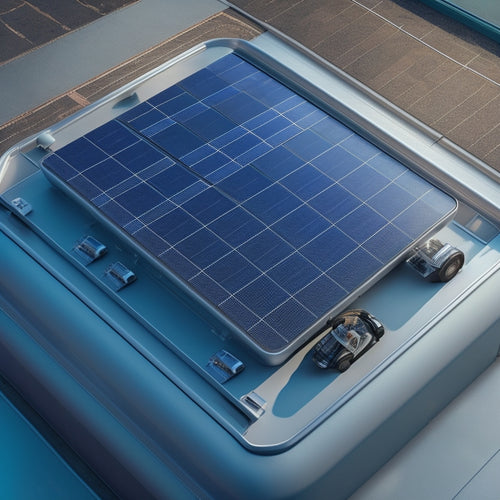
Top Energy-Efficient Solar Panels for Homes and Businesses
Share
You're looking for the most energy-efficient solar panels to power your home or business, and with efficiency ratings ranging from 7-22%, choosing the right one can greatly influence your energy output and savings. High-efficiency solar panels, like those from SunPower, Panasonic, and Tesla, offer ratings above 20%, maximizing energy output. Bifacial panels, perovskite, and tandem solar cells are innovations pushing the boundaries of energy efficiency. When selecting a solar panel, consider warranty duration, temperature coefficient, and durability. To optimize your energy savings, investigate the best options for your specific needs, and uncover how top energy-efficient solar panels can slash your energy bills and carbon footprint.
Key Takeaways
- High-efficiency solar panels with ratings above 20% maximize energy output, with monocrystalline panels leading the way at 18-22% efficiency.
- Top brands like SunPower, Panasonic, and Tesla offer high-efficiency panels, with SunPower's X-Series boasting a 22.8% efficiency rating.
- Residential solar panels can significantly reduce energy bills and carbon footprints, with installation costs varying based on equipment type and system size.
- Commercial solar panel solutions offer incentives like tax credits up to 30% of total costs, making them an attractive option for businesses.
- Energy-efficient solar panels lead to long-term savings through reduced maintenance costs, increased property value, and financial incentives.
Understanding Energy Efficiency Ratings
Since you're considering investing in energy-efficient solar panels, understanding energy efficiency ratings is crucial to making an informed decision. Energy efficiency ratings measure a solar panel's ability to convert sunlight into electricity, with higher ratings indicating better performance.
Look for panels with high efficiency ratings, typically above 20%, to maximize your energy output.
When evaluating energy efficiency ratings, consider the type of solar panel technology used. Monocrystalline silicon panels tend to be more efficient than polycrystalline silicon panels.
Additionally, advanced solar innovations, such as bifacial panels, can increase energy efficiency by capturing light from both the front and back sides of the panel.
To guarantee you're getting the most energy-efficient solar panels, check the manufacturer's specifications and certifications. Reputable manufacturers will provide detailed information on their products' energy efficiency ratings, and many will have certifications from organizations like the International Electrotechnical Commission (IEC).
Top Solar Panel Brands Compared
When shopping for energy-efficient solar panels, you'll likely come across a multitude of brands vying for your attention. It's crucial to compare top solar panel brands to guarantee you're getting the best performance for your investment.
In terms of performance comparisons, brands like SunPower, Panasonic, and Tesla stand out for their high-efficiency ratings. SunPower's X-Series Residential Solar Panels boast an impressive 22.8% efficiency rating, while Panasonic's HIT-240 Series offers a 21.8% efficiency rating. Tesla's Solar Roof tiles, on the other hand, have an efficiency rating of around 20.6%.
Other notable brands include LG, Hanwha Q CELLS, and Trina Solar, which offer competitive efficiency ratings and warranties.
When comparing solar panel brands, consider factors like warranty duration, temperature coefficient, and durability in addition to efficiency ratings. By assessing these factors, you can make an informed decision about which brand best suits your energy needs and budget.
Ultimately, choosing a reputable brand with high-performance solar panels will guarantee you maximize your energy savings and minimize your environmental footprint.
High-Efficiency Solar Panels Explained
You're likely familiar with the concept of panel efficiency ratings, which measure a solar panel's ability to convert sunlight into electricity.
But what makes a high-efficiency solar panel truly stand out is the advanced cell technology behind it.
As you investigate high-efficiency solar panels, you'll uncover how innovations in cell design and materials have led to significant performance enhancements.
Panel Efficiency Ratings
Your solar panel's efficiency rating is a critical metric that determines how much electricity it can generate from the sun's energy. This rating is usually expressed as a percentage, with higher percentages indicating more efficient energy production. When selecting a solar panel, it's vital to take into account the efficiency rating to guarantee you're getting the most out of your investment.
Here's a breakdown of common solar panel types and their corresponding efficiency ratings:
| Solar Panel Type | Efficiency Rating | Energy Production |
| Monocrystalline | 18-22% | High |
| Polycrystalline | 15-18% | Medium |
| Thin-Film | 7-14% | Low |
As you can see, monocrystalline solar panels have the highest efficiency rating, making them ideal for homes and businesses with limited roof space. Polycrystalline solar panels offer a more affordable option with moderate energy production, while thin-film solar panels are the most budget-friendly but produce the least amount of energy. When choosing a solar panel, take into account your energy needs and budget to select the most suitable option for your situation.
Cell Technology Advancements
High-efficiency solar panels are made possible by advances in cell technology, which have greatly improved energy production.
As you investigate the latest developments, you'll find that bifacial technology allows panels to utilize energy from both sides, increasing output by up to 25%.
Perovskite cells, a new class of materials, offer higher power conversion efficiency rates than traditional silicon-based cells.
Tandem solar cells, which stack different materials, can achieve efficiencies of over 30%.
Thin film innovations have also improved, reducing material usage and costs while maintaining performance.
Recycling solutions are being developed to minimize waste and recover useful materials.
To guarantee seamless integration with the grid, advanced grid integration systems are being implemented.
Performance monitoring and solar tracking systems optimize energy production, adjusting to changing environmental conditions.
Residential Solar Panel Options
You're likely considering residential solar panels to reduce your energy bills and carbon footprint.
When evaluating options, you'll want to assess how much you can save on home energy costs, as well as the panel efficiency ratings that impact your system's overall performance.
Additionally, you'll need to factor in installation costs, which vary depending on the type and quality of equipment, as well as the complexity of the installation.
Home Energy Savings
With the rising cost of traditional energy sources, homeowners are increasingly turning to residential solar panels as a viable alternative for powering their homes.
As you consider making the switch to solar, you're likely wondering how it can benefit your household. The good news is that residential solar panels can lead to significant home energy savings.
To maximize your energy savings, it's important to assess your home's energy efficiency before installing solar panels.
Here are a few steps you can take:
- Conduct an energy audit to identify areas in your home where energy is being wasted
- Implement home automation solutions to optimize your energy usage
- Seal air leaks and add insulation to reduce heat loss in the winter and heat gain in the summer
Panel Efficiency Ratings
As you investigate residential solar panel options, understanding panel efficiency ratings becomes essential in determining the performance of your solar panel system.
You'll want to know how efficiently your solar panels convert sunlight into electricity. Efficiency ratings are calculated based on the amount of energy a panel produces per unit area. A higher efficiency rating means more electricity generated per hour of sunlight.
When evaluating panel efficiency, look for ratings between 15% and 22%. Top-performing panels typically have efficiencies above 18%.
Keep in mind that higher efficiency doesn't always mean better. Other factors like panel size, durability, and warranty affect overall panel performance.
Efficiency benchmarks are set by organizations like the National Renewable Energy Laboratory (NREL) and the International Electrotechnical Commission (IEC). These benchmarks guarantee that solar panels meet certain standards for performance and quality.
When selecting solar panels, consider efficiency ratings alongside other factors like cost, durability, and manufacturer reputation to guarantee you get the best system for your needs.
Installation Cost Factors
Your residential solar panel installation cost depends on several key factors, including the type and quality of equipment, system size, and installation complexity. These factors can greatly impact the overall cost of your solar panel system.
-
Installation permits, labor costs, and site assessments are essential expenses to evaluate. These costs can vary depending on your location and the complexity of the installation process.
-
Roof conditions, such as size, orientation, and shading, can also affect the installation cost. For instance, a roof with multiple skylights or complex angles may require additional labor and materials, increasing the overall cost.
Additionally, you should assess incentive programs, financing options, and maintenance expenses when calculating the total cost of ownership.
Energy audits, which assess your energy usage and identify areas for improvement, can also influence the installation cost. By understanding these factors, you can make an informed decision about your residential solar panel installation and optimize your energy savings.
Commercial Solar Panel Solutions
Commercial solar panel solutions have taken center stage as businesses seek to reduce their carbon footprint and operating costs. As you investigate options for your business, it's crucial to evaluate the various commercial incentives and solar financing opportunities available. These can greatly influence the upfront costs and long-term savings of your solar panel investment.
| Commercial Incentives | Solar Financing Options |
|---|---|
| Tax credits (up to 30% of total cost) | Cash purchase or loan |
| Depreciation benefits (MACRS) | Power Purchase Agreements (PPAs) |
| State and local rebates | Solar leases |
| Net metering | Community solar programs |
| Renewable Energy Certificates (RECs) | Property Assessed Clean Energy (PACE) financing |
When assessing commercial solar panel solutions, evaluate factors such as system size, panel efficiency, and installation costs. By taking advantage of commercial incentives and investigating solar financing options, you can optimize your return on investment and start generating clean energy for your business.
Cost Benefits of Energy Efficiency
Energy-efficient solar panels offer a trifecta of cost benefits: reduced energy consumption, lower operating expenses, and increased property value. By installing energy-efficient solar panels, you'll not only reduce your reliance on the grid but also reap significant financial rewards.
You'll benefit from:
- Financial incentives like tax credits and utility rebates that offset the initial investment
- Long-term savings through lower energy bills and reduced maintenance costs
- Increased property value, making your home or business more attractive to potential buyers
When you invest in energy-efficient solar panels, you'll enjoy a faster payback period and higher investment returns.
A thorough energy audit and cost analysis will help you identify areas of improvement, ensuring you get the most out of your solar panel system.
With energy-efficient solar panels, you'll be saving money and the environment, making it a win-win situation.
Future of Energy Efficiency in Solar
As solar technology continues to advance, the future of energy efficiency in solar is set to revolutionize the industry. You can expect significant improvements in solar innovations, future technologies, and sustainable practices that will shape the industry's environment.
| Future Trends | Impact on Energy Efficiency |
|---|---|
| Advancements in Energy Storage | Increased grid integration and reduced energy waste |
| Policy Impacts and Incentives | Encouragement of consumer adoption and market growth |
| Grid Integration and Smart Grids | Enhanced energy management and distribution |
| Consumer Trends and Education | Increased demand for sustainable practices and energy-efficient solutions |
As you consider the future of energy efficiency in solar, it's crucial to stay informed about emerging trends and technologies. By doing so, you'll be better equipped to make informed decisions about your energy needs and contribute to a more sustainable future. With the industry ready for significant growth, it's an exciting time to be a part of the energy-efficient solar movement.
Frequently Asked Questions
Can I Install Solar Panels on a Metal or Clay Roof?
You can install solar panels on a metal or clay roof, but be aware of installation challenges specific to these roofing materials, such as securing panels to metal seams or ensuring waterproofing with clay tiles.
Do Energy-Efficient Solar Panels Work in Low-Light Conditions?
Imagine a cloudy day, but you're still utilizing power; that's what you get with energy-efficient solar panels. You'll benefit from advanced low light performance, maximizing energy absorption even on gloomy days, so you can stay connected to a sustainable lifestyle.
Are Solar Panels Recyclable at the End of Their Life?
You're probably wondering if solar panels can be recycled when they reach the end of their life. Fortunately, yes, you can recycle them! Solar panel recycling offers effective end-of-life solutions, ensuring environmentally responsible disposal and useful material recovery.
Can I Use Solar Panels to Charge My Electric Vehicle?
You can definitely use solar panels to charge your electric vehicle through solar charging, which involves installing a charging station connected to your solar panel system, allowing you to fuel up sustainably and reduce your carbon footprint.
Do Energy-Efficient Solar Panels Come With a Longer Warranty?
As you step into the world of renewable energy, you'll find that energy-efficient solar panels often come with a silver lining - a longer warranty that shields your investment. When comparing warranties, you'll uncover that top-tier panels boast longer lifespans, ensuring your green energy dreams stay within reach.
Conclusion
As you utilize the power of the sun, remember that "the best is the enemy of the good" - and in this case, the best is energy efficiency. By choosing high-quality solar panels, you'll be sipping from the cup of sustainability, just like the mythical Greek gods sipped from the River Styx, granting them invincibility. With the right panels, you'll be invincible against rising energy costs and environmental degradation, setting the stage for a brighter, more efficient future.
Related Posts
-

Top Solar Panels for Car Battery Maintenance
When selecting top solar panels for car battery maintenance, consider high-efficiency models with high wattage output...
-

What You Need to Know About Permits and Inspections
You need to navigate the complex landscape of permits and inspections to guarantee your project complies with local z...
-

What Makes a Road Bike-Friendly by Design?
As you plan and design roads, incorporating features like dedicated bike lanes, smooth surfaces, and traffic calming ...


